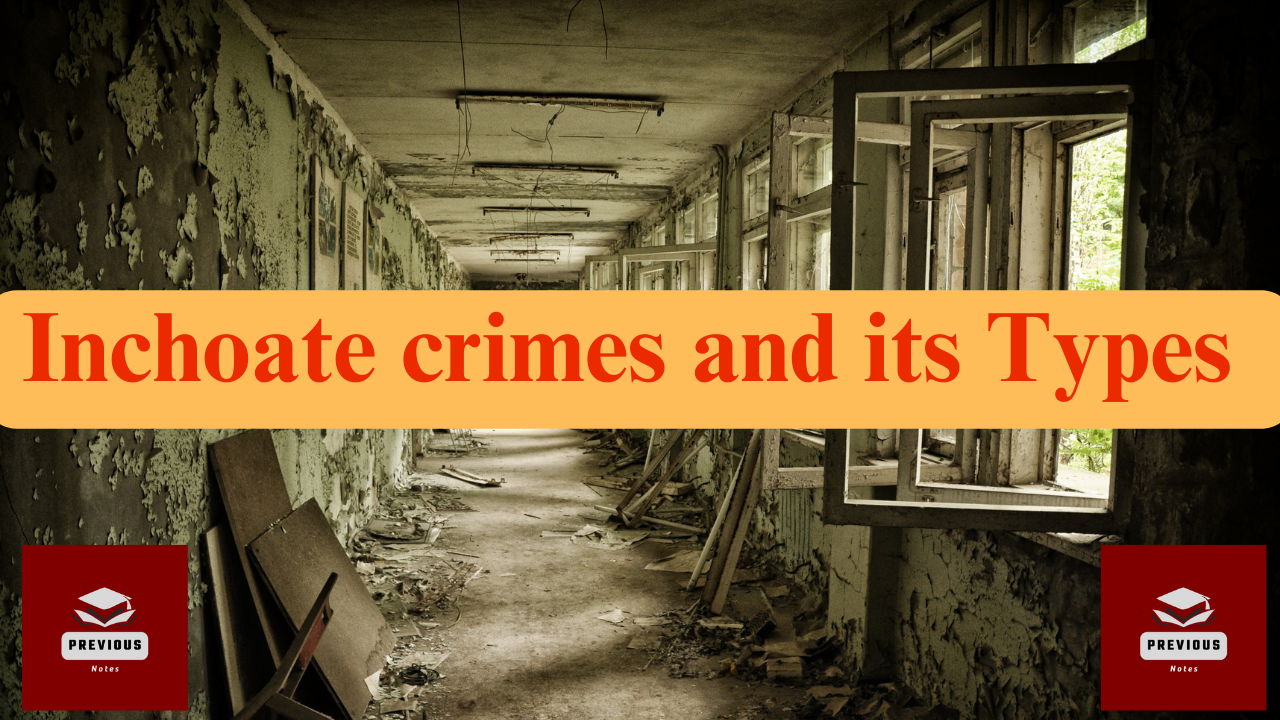Inchoate Crime Definition and Types:
Crime doesn’t always have to involve an injury or loss to another person. Some Acts which even though does not harm another person or doesn’t fulfil the essentials of a crime even though regarded as Crime. These Crimes are Called Unfinished Crimes or Inchoate Crimes.
Inchoate crimes, also known as incomplete or anticipatory crimes, are offenses that involve actions taken toward committing a crime but where the crime itself is not completed. The concept is based on the idea of punishing individuals for their intent and steps toward committing a crime, even if the crime itself is not ultimately realized.
- Where intended Mens Rea is not fulfilled is called Inchoate Crime.
- Acts short of completion of crime which is not fully developed.
- “Conduct deemed criminal without actual harm being done, provided that the harm that would have occurred is one the law tries to prevent.”
- In inchoate crime, all the requirements of offence are not fulfilled, yet the actor is punished
Examples:
- Making a threat even though a person does not mean to do that threatening act, but still it is a crime.
- Unfinished Crimes charged as “Attempts’ as described in IPC Sec. 511.
Involve:
- Planning & Preparation to Commit Crime.
- Attempt to commit a crime, even unsuccessful.
- Conspiracy to commit a crime.
- Aiding & Abetting a Crime.
- Solicitation
Mainly Three Types of Inchoate Crimes:
- Attempt
- Criminal Conspiracy
- Abetment
Read Related Articles to this Topic:
Attempt: Inchoate Crime
Attempt: “An ‘Attempt to crime’ is when someone tries to commit a crime but fails.
“A direct movement towards the commission of a crime”.
‘Attempt’ is not defined in the Indian Penal Code. Section 511 of the IPC only dealt with punishment for attempting to commit offences.
How Attempt is Inchoate Crime?
Attempt occurs when a person takes substantial steps towards committing a crime but does not complete the crime. To prove an attempt, it must be shown that the individual had the intent to commit the crime and took a significant action towards its completion.
Attempt is an Inchoate Crime or Incomplete Crime as the main essentials of the crimes does not complete, injury to the person does not happen in case of Crime. Element of Injury is absent here so it is categories as Inchoate Crime.
Read Related Articles to this Topic:
Criminal Conspiracy: Inchoate Crime
When two or more person agree to do an criminal act, only agreement to commit an offence is Criminal Conspiracy.
- Conspiracy deals with an exchange of common mens rea between two or more persons
- Thus, there are two essential ingredients of criminal conspiracy namely; i) agreement between two or more person and ii) the object of such agreement is to commit an illegal act or legal act by illegal means.
IPC Section 120A
Under Section 120A of the IPC, criminal conspiracy is characterised as an arrangement between at least two individuals to attempt anything illicit, i.e.:
- A criminal offence
- A demonstration that is not restricted by regulation yet is completed unlawfully
How Criminal Conspiracty is Inchoate Crime?
Here mere agreement between two or more person to commit a criminal offence is regarded as crime under sec. 120A of IPC, this act does not fulfil the main elements of the crime, even actus reus is absent here, no injury is made to the person, still it is a punishable offence in India. Since it does not fulfil the essential of a crime hence it is regarded as Inchoate Crime or Incomplete Crime.
Abetment:Inchoate Crime
Abetment covers various scenarios where one person influences the other person via instigation, conspiracy or aid.
A person may commit an offence himself or abets another person to commit an offence. The former is called principal offender and the latter is abettor. The person who acts is called abetted person.
- abetment denotes an act or process of inducement, encouragement, assistance or command for the purpose of commission of an offence.
- Section 107 to 120 of IPC deals with Abetment and its punishment.
How Criminal Conspiracty is Inchoate Crime?
Here Mens Rea and Actus Rea are of different persons. Hence regarded as incomplete or inchoate crime. It is not necessary that the abetted person should have the same mens rea as the abettor.
You May Also Like:
You May Also Like:
Euthanasia in India, Right to die with Dignity
Right to Privacy Case Law Mr. X vs. Hospital Z
Federal Constitution Definition and key points
University of Madras vs. Shantabai,1954: Article 12 Case Law
Article 20 Fundamental Right with Case Laws
Article 19 Fundamental Right of Indian Constitution with 10 Case Laws
Article 358, 359 Fundamental rights during emergency
Parliamentary Privileges and Fundamental Rights with Case Laws
Article 14 Fundamental Right with Case Laws
Article 15 Fundamental Right with Case Laws
Article 12 Fundamental Right with Case Laws
DOMESTIC VIOLENCE AS TORT | APPLICATION OF TORT LAW
Crimes without Mens Rea? Statute without Mens Rea.
Definition of crime by various jurists, Criminology
Methods of Studying Criminology
All about Capital Punishment with Case Laws
IMPOSSIBLE ATTEMPT | ATTEMPT VS IMPOSSIBLE ATTEMPT
Forms of Judicial Process: Adversarial & Inquisitorial
DOMESTIC VIOLENCE AS TORT | APPLICATION OF TORT LAW
Economic Tort | Business Tort: Application of Tort Law
Crimes without Mens Rea? Statute without Mens Rea.
IMPOSSIBLE ATTEMPT | ATTEMPT VS IMPOSSIBLE ATTEMPT
Specific Principles of Criminal Law | LLM Previous Year Paper 2024 | CCSU
Specific Torts | LLM 4th Semester Previous Year Paper 2024 | CCSU
History and Basic Principles of Criminal Law | Previous Paper 2023
LLM Previous Year Paper 2023 | PRIVILEGED CLASS DEVIANCE
PENOLOGY PREVIOUS YEAR PAPER | LLM | CCSU

Leave a Reply Cancel reply